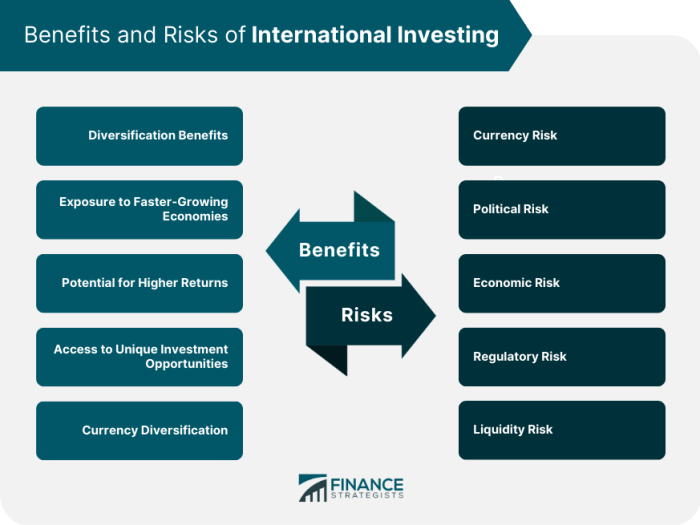Diving deep into the realm of international investments, get ready to embark on a journey that will broaden your financial horizons. From stocks to real estate, we’re about to explore the ins and outs of investing on a global scale with a touch of American high school hip style.
In this guide, we’ll cover the basics of international investments, break down the influencing factors, delve into strategies, and get a sneak peek into the latest trends shaping the international investment landscape. So, buckle up and let’s navigate the world of finance together.
Overview of International Investments
International investments refer to putting money into assets or securities outside of one’s home country. This can include stocks, bonds, real estate, or other financial instruments in foreign markets.
Diversifying investment portfolios internationally is crucial for spreading risk and potentially increasing returns. By investing in different countries and industries, investors can reduce the impact of economic downturns or market fluctuations in any one region.
Types of International Investments
- Stocks: Buying shares of foreign companies listed on international stock exchanges.
- Bonds: Investing in government or corporate debt issued by foreign entities.
- Real Estate: Purchasing property or real estate assets in other countries for rental income or capital appreciation.
Benefits and Risks of International Investments
Investing internationally can offer several benefits, such as:
- Access to new markets and industries for potential growth opportunities.
- Diversification to reduce risk and increase overall portfolio stability.
- Potential currency diversification to hedge against fluctuations in exchange rates.
However, there are also risks associated with international investments, including:
- Political and economic instability in foreign countries impacting investment returns.
- Currency exchange rate fluctuations affecting the value of investments.
- Lack of familiarity with foreign markets and regulatory environments leading to potential pitfalls.
Factors Influencing International Investments
When it comes to international investments, there are various factors that can have a significant impact on decision-making and outcomes.
Economic Factors
- Exchange Rates: Fluctuations in exchange rates can directly affect the value of investments made in foreign currencies, impacting returns.
- Inflation: High inflation rates in a country can erode the real value of investments over time, reducing overall profitability.
Political Factors
- Government Stability: Political instability can lead to uncertainty and risk for investors, affecting their confidence in the market.
- Regulations: Stringent regulations or sudden policy changes can impact the ease of doing business in a foreign country, influencing investment decisions.
Global Events
- Trade Agreements: International trade agreements can open up new markets and opportunities for investors, driving investment flows.
- Conflicts: Political conflicts or wars can create instability in regions, leading to heightened risk and potential losses for investors.
Cultural Differences
- Communication Styles: Varied communication norms can impact business relationships and decision-making processes in international investments.
- Business Practices: Different cultural approaches to negotiation, contracts, and business ethics can affect the success of investment ventures.
Strategies for International Investments

Investing internationally requires careful consideration of various strategies to maximize returns and manage risks effectively.
Different Strategies for Investing Internationally
- Direct Investments: Involves purchasing assets in a foreign country, such as real estate or businesses.
- Mutual Funds: Pool funds from multiple investors to invest in a diversified portfolio of international securities.
- ETFs (Exchange-Traded Funds): Trade on stock exchanges like individual stocks, providing exposure to a specific market or index.
Compare and Contrast Active vs. Passive International Investment Strategies
- Active Strategies: Involve frequent buying and selling of assets to outperform the market. Requires more research and expertise but can potentially lead to higher returns.
- Passive Strategies: Aim to replicate the performance of a specific market index. Typically have lower fees and are more hands-off, suitable for investors looking for long-term growth.
The Role of Emerging Markets in International Investment Strategies
Emerging markets offer high growth potential but also come with higher risks. Investors can diversify their portfolio by allocating a portion to emerging markets to benefit from their growth prospects.
Tips for Managing Currency Risks When Investing Internationally
- Hedging: Use financial instruments like currency futures or options to protect against currency fluctuations.
- Diversification: Spread investments across different currencies to reduce exposure to any single currency risk.
- Stay Informed: Keep track of geopolitical events, economic indicators, and central bank policies that can impact currency movements.
International Investment Trends
International investment trends are constantly evolving, influenced by various factors such as technological advancements, geopolitical events, and changing investor preferences. Let’s dive into some of the key trends shaping the landscape of international investments.
Impact Investing and Sustainable Investing
Impact investing and sustainable investing have gained significant traction in recent years as investors increasingly prioritize environmental, social, and governance (ESG) criteria in their investment decisions. Impact investing focuses on generating positive social and environmental outcomes alongside financial returns, while sustainable investing aims to support companies with sustainable business practices.
Rise of Digital Platforms
The rise of digital platforms has revolutionized the way international investments are made, providing investors with easy access to global markets and a wide range of investment opportunities. These platforms offer convenience, transparency, and efficiency, making it easier for individuals and institutions to diversify their investment portfolios internationally.
Technology in Investment Decision-Making
Technology plays a crucial role in shaping international investment decision-making processes, enabling investors to access real-time market data, conduct thorough research, and execute trades efficiently. Advanced analytics, artificial intelligence, and machine learning algorithms are increasingly being utilized to identify investment opportunities and manage risks effectively.
Geopolitical Events Impact
Geopolitical events, such as trade disputes, political instability, and regulatory changes, can significantly impact international investment trends. Uncertainty stemming from geopolitical events may lead to market volatility, affecting investor sentiment and investment flows. It is essential for investors to stay informed and adapt their strategies to navigate potential risks arising from geopolitical developments.
